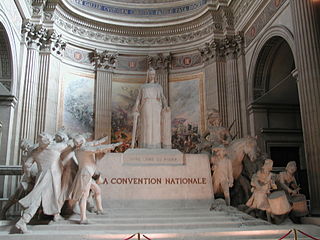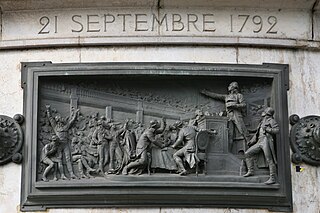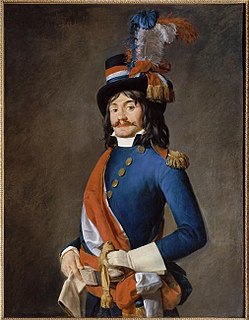 W
WThe first election for the National Convention of France was held in 1792. It established the nation's first government without a monarch.
 W
WThe Committee of General Security was a French parliamentary committee which acted as police agency during the French Revolution. Along with the Committee of Public Safety it oversaw the Reign of Terror. The Committee of General Security supervised the local police committees in charge of investigating reports of treason, and was one of the agencies with authority to refer suspects to the Revolutionary Tribunal for trial and possible execution by guillotine.
 W
WThe Committee of Public Safety formed the provisional government in France, led mainly by Maximilien Robespierre, during the Reign of Terror (1793–1794), a phase of the French Revolution. Supplementing the Committee of General Defence created after the execution of King Louis XVI in January 1793, the Committee of Public Safety was created in April 1793 by the National Convention and restructured in July 1793. It was charged with protecting the new republic against its foreign and domestic enemies, fighting the First Coalition and the Vendée revolt. As a wartime measure, the committee was given broad supervisory and administrative powers over the armed forces, judiciary and legislature, as well as the executive bodies and ministers of the Convention.
 W
WThe Law of 22 Prairial, also known as the loi de la Grande Terreur, the law of the Great Terror, was enacted on 10 June 1794. It was proposed by Georges Auguste Couthon but seems to have been written by Robespierre according to Laurent Lecointre. By means of this law the Committee of Public Safety simplified the judicial process to one of indictment and prosecution.
 W
WThe ministers of the French National Convention were appointed on 10 August 1792 after the French Legislative Assembly suspended King Louis XVI and revoked the ministers that he had named.
 W
WThe Mountain was a political group during the French Revolution. Its members, called the Montagnards, sat on the highest benches in the National Assembly.
 W
WDuring the French Revolution, the proclamation of the abolition of the monarchy was a proclamation by the National Convention of France announcing that it had abolished the French monarchy on 21 September 1792.
 W
WDuring the French Revolution, a représentant en mission was an extraordinary envoy of the Legislative Assembly (1791–92) and its successor the National Convention (1792–95). The term is most often assigned to deputies designated by the National Convention for maintaining law and order in the départements and armies, as they had powers to oversee conscription into the army, and were used to monitor local military command. At the time France was in crisis; not only was war going badly, as French forces were being pushed out of Belgium, but also there was revolt in the Vendée over conscription into the army and resentment of the Civil Constitution of the Clergy.
 W
WThe trial of Louis XVI—officially called "Citizen Louis Capet" since being dethroned—before the National Convention in December 1792 was a key event of the French Revolution. He was convicted of high treason and other crimes, resulting in his execution.